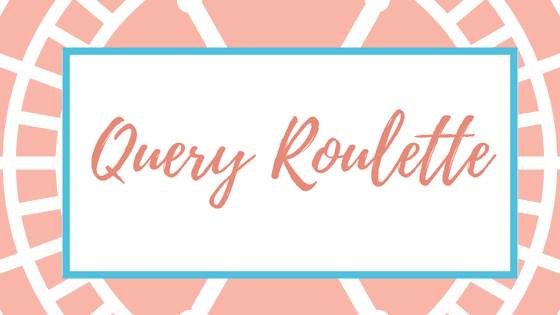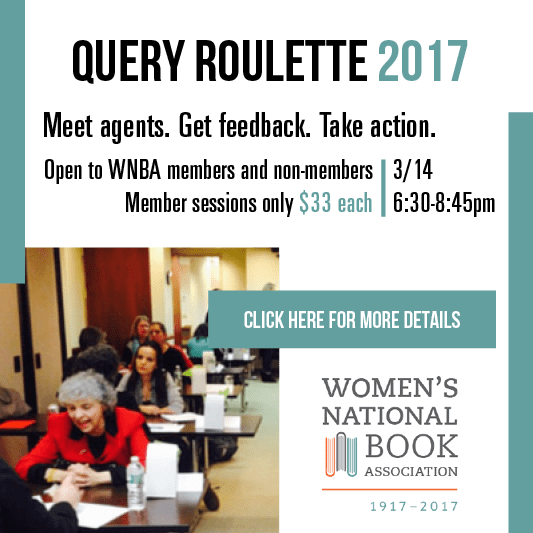 If you’ve signed up for a slot at Query Roulette, chances are you’ve been working hard on your query letter. But a little fine-tuning never hurts: read on for advice straight from agents who’ve participated in Query Roulette over the past few years.
If you’ve signed up for a slot at Query Roulette, chances are you’ve been working hard on your query letter. But a little fine-tuning never hurts: read on for advice straight from agents who’ve participated in Query Roulette over the past few years.
Make it short!
 “For letters, I often wish for brevity above all – a few introductory sentences (including comparable titles if you have them in mind), a paragraph about the book, and a paragraph about the writer….Full plot synopses are hard to read and easy to glaze over.” —Laura Usselman
“For letters, I often wish for brevity above all – a few introductory sentences (including comparable titles if you have them in mind), a paragraph about the book, and a paragraph about the writer….Full plot synopses are hard to read and easy to glaze over.” —Laura Usselman
“Don’t have your query letter be overlong.” —Tamar Rydzinski
“Short and powerful is better than long and empty….First paragraph: what is the book being pitched? Second: what are the author’s credentials making this an exciting project?” —Rita Rosenkranz
“I don’t want to see more than a one-page query letter.” —Sarah Younger
“Anything that isn’t a 3-5 sentence pitch of the story plus a short author bio would be gratuitous.” —Sarah Lapolla
Stay focused!
“Focus on the primary characters (usually your protagonist, antagonist, and love interest if appropriate) and plot. Since you only have about 250 words to distill your entire novel, focus on what I need to know about your story.” —Gabrielle Piraino
“…a short plot description—not a play-by-play….who the author is, but not whether the author is married, has children or cats, or enjoys the flute—unless the book is about a cat-owning flautist!” —Josh Getzler
Be clear!
 “Main rule is: don’t get cute. Just tell me who you are and the premise of your book.” —Christina Morgan
“Main rule is: don’t get cute. Just tell me who you are and the premise of your book.” —Christina Morgan
“I sometimes get queries where I don’t know what the writer is pitching. I can’t tell what the project is about—or even if it is fiction or non-fiction. That, to me, reflects the author’s insecurity about what they’re writing.” —Rita Rosenkranz
“Writer beware, it doesn’t look great if you can’t accurately define the genre of your own work…” —Stacy Testa
Don’t insult anyone (even yourself)!
“There’s a surprising number of query letters that begin by demeaning the profession of agenting. As in, ‘It’s ridiculous that agents should have all the power and I resent that you’re the gatekeepers of the industry but since you are I guess I have to pitch you my book.’ I can only assume it’s a twisted attempt at ‘negging’ but the much more likely outcome is that the author comes across as rude and difficult to work with.” —Stacy Testa
“I’m not a fan of queries that disparage published books or publishing trends…as a means of complimenting what the querier has written. I get a lot of ‘I wrote a YA, but don’t worry. It’s not some silly vampire love story.’ This sort of snobbery…drives me bonkers!” —Tina Wexler
“I don’t want self-deprecation (‘I know you must get 4 million queries a day, and I know you must be sick of sparkly vampires, but…’).” —Josh Getzler
Show who you are!
 “I am looking for a concise and intriguing pitch and a synopsis that both tells me what the book is about and showcases the writer’s voice and style.” —Samantha Fingerhut
“I am looking for a concise and intriguing pitch and a synopsis that both tells me what the book is about and showcases the writer’s voice and style.” —Samantha Fingerhut
“Beautiful writing—a writer either has that talent or you don’t. And when it’s in a query letter, I’ll overlook just about any other mistake to read more.” —Jaida Temperly
“I LOVE to see confidence in a query letter. First, it’s the confidence and joy in your own writing and knowing you’ve revised the book as much as you can….Secondly, it’s confidence in knowing you’re an avid reader of both recent releases and related titles so you know where your book fits in the marketplace and also what makes it stand out.” —Katie Grimm
Be unique!
“I am often wary of books that seem as though they were written to capitalize on a particular fascination of our current publishing moment….I love to see that a writer came to a book through their own organic fascination with a topic or obsession with a character.” —Laura Usselman
“Excitement spills into over-saturation very quickly – so it’s best to be aware of what’s trending, but not driven by it.” —Susan Hawk
“I’d suggest the writer, above all, remain faithful to his or her own vision for the project. The best agent for them will not only connect to that vision, but will also help the writer develop a vision for the project’s future.” —Aimee Ashcraft
Do the work!

“If I had to pick the top thing I hate seeing, it’s laziness. Your query letter is your first impression – make it a good one and proofread!” —Amelia Appel
“Essentially, do your research, follow the basic instructions, and please use my name.” —Gabrielle Piraino
Don’t force it!
“It’s good to [mention] it’s #ownvoices if it is! And as ever, it’s always about the story, so focus on that and include details about diversity or multiculturalism in an organic way!” —Victoria Marini
“I like to know if there are diverse voices or the novel is #ownvoices, but I don’t need to know which characters are specifically diverse unless it fits naturally into the query.” —Gabrielle Piraino
Understand that it’s unique!
“The [query letter] is not necessarily an intuitive document. Everyone has different issues, wants, and expectations.” —Emily Brown
HOW TO:
Write your plot description

“I don’t want rhetorical questions as hooks (‘How would you feel if your third cousin killed JFK?’ ‘What if the world were slowly being taken over by termites?’).” —Josh Getzler
“One’s pitch shouldn’t necessarily sound overly rehearsed, but it should not meander. It should be clear and precise—a thumbnail delivery as though they were repeating the back cover copy.” —Rita Rosenkranz
Give your bio
“A platform and a link to your social media is appropriate if you have an impressive and well-established platform; if you are just starting out, it can be more of a distraction for me.” —Laura Usselman
Choose comp titles
“Who do you write like? What audience are you trying to capture with your book?” —Latoya C. Smith
“[Don’t use] outdated comp titles! They should be published in the last 5 years. It shows the agent that you’re well-read and aware of the market in which you are writing.” —Tess Callero
“Not that it’s ‘the next ___’ but to say ‘I wrote a novel that has literary and speculative (but not quite sci-fi) elements like Station Eleven.’” —Katie Grimm
“I don’t want outlandish comps—I don’t need to know that your YA is a combo of Harry Potter and The Hunger Games.” —Josh Getzler
“Don’t compare your book to a phenomenon (like Harry Potter, The Girl on the Train, or The Nightingale, etc.) as that is unhelpful to you and actually tells me that you don’t read enough in the genre in which you are writing.” —Tamar Rydzinski
HEADING TO QUERY ROULETTE:

“Don’t be afraid to bring written materials or anything you feel you need to make your best pitch.” —Latoya C. Smith
“Please bring a few pages with you….For me, it’s all about the writing – so if the concept sounds intriguing, I really love to read a couple of paragraphs to get your sense of voice.” —Jeff Kleinman
AT QUERY ROULETTE:
“Have fun! Yes, Query Roulette is a professional opportunity, but it’s also a chance to spend time with likeminded people, people who love the same things you do: strong characters, great writing, compelling stories, books.” —Tina Wexler
“Don’t be nervous! I know that’s hard, but I am here because I want to find great books and great authors. I can’t wait to hear about your book. But do practice your pitch many times beforehand.” —Tamar Rydzinski
“I would just advise attendees to, first of all, relax….Coming in with your materials ready to send if requested always seems to work better.” —Sarah Younger
“Query letters are tough to get right. Don’t get discouraged if I completely pick it apart!” —Elizabeth Winick Rubinstein
“Try to relax; we want to encourage you. And if I turn down your pitch, it doesn’t mean I don’t like it—it means that I don’t feel I’d be the right fit as agent, and that another agent might know better how to embrace your idea and run with it.” —Eric Myers
To register for Query Roulette, clickhere – there are only a few slots left!
To receive a members-only discount forQuery Roulette, register for the WNBAhere.




